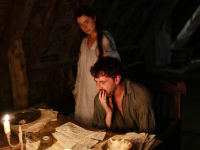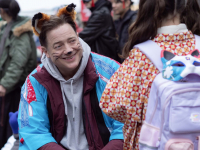
 Socially potent and contextually relevant to our times, can DC leave us in wonder of this remarkable woman?
Socially potent and contextually relevant to our times, can DC leave us in wonder of this remarkable woman?
Wonder Woman has long been drifting on the DC horizon, a mirage with the promise of action, spectacle and, for some fans, empowerment, to finally equal their Marvel rivals. The opening scenes, which begin in modern day Paris before we are swept across the sea to Themyscira, strike with the power of stunning visuals and fight scenes that will satisfy the most seasoned sci-fi or fantasy audiences.
Alongside the actors themselves, whose superhuman athleticism was let down only by their lack of screen time, fight coordinator Wayne Dalglish must take some credit for the impact of the battle scenes. Sparingly and masterfully used with pinpoint precision, the film’s approach to conflict brings a humanity to the potentially problematic nature of real world combat. This is only enhanced by the intricacy that leading lady Gal Godot manages to layer over her own martial prowess, which is both poignant and hilarious in equal measures.
One of the joys of Wonder Woman’s satirical comedy is witnessing the film’s male characters, in particular Steve Trevor (Chris Pine), navigating their dealings with a woman who does not see herself as a sexual object. The stiff-upper-lip repression of 1918, a year that encompassed the end of WW1 and a victory for the women’s suffrage movement, provides the juxtaposition for Gadot’s emotion-driven agency. With this setting Patty Jenkins has built a world that does not shy away from challenging the exclusion of women in wartime political action, while Diana embodies the progressiveness that enabled the birth of gender equality movements and the rise of Leftist politics.
Gadot and Pine as a duo work flawlessly to represent this historical awkwardness. Their romance is a muted and unobtrusive subplot, written and performed in such a way that it does not undermine the more important matters at hand. Both characters are individuals but driven by shared objectives. For once there is no need for one to compromise the achievement of their goal for the sake of the other’s.
The battle won, there is a bitter taste to the sweetness of victory, as we all know too well what follows the brief peace achieved at the end of the First World War. Against the backdrop of this historical period of rapid technological advancement, Diana’s first-time encounters with modern weaponry and wartime politics are not as forced or cheesy as they could have been. Her frequent re-evaluations of her own identity as a warrior and the oppositional roles of violence and diplomacy in peace-making mirror those of the soldiers of the time, and help audiences connect with the true fear of facing unknown and seemingly unbeatable weapons.
There are shortcomings, the forgettability of the soundtrack and the opening and closing sequences that do little but remind us that this film does have relevance in the modern day, without really clarifying what that relevance is intended to be. However, as a symbol of progress, both for women in the entertainment industry and for DC, it is a truly wondrous piece of work.

Author: Joe, Bath store





